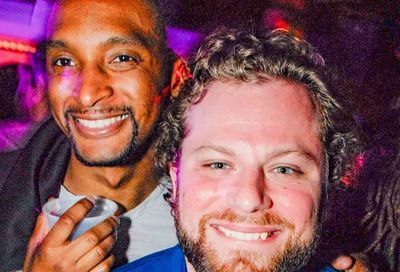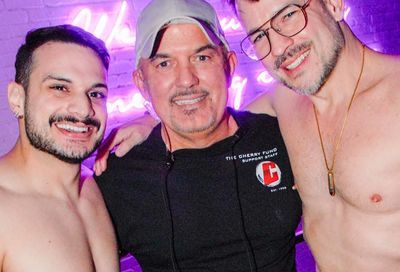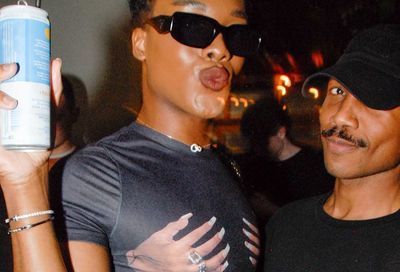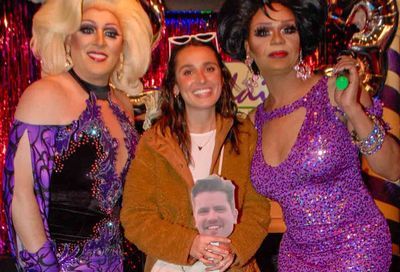Healthy Dialogue
Panel discusses issues for Lesbian, Gay, Bisexual & Transgender Health Awarness Week
As part of National LGBT Health Awareness Week, Whitman-Walker Clinic on Tuesday night presented a public forum on gay health. “It’s a little smaller crowd than what we had hoped for, but sometimes small is mighty,” said Roberta Geidner-Antoniotti, the clinic’s interim executive director, as she opened the evening for roughly a dozen attendees. “It’s a very important week for all of us…. We know that there are huge disparities.”
While the crowd may have been on the small side, the panel of four speakers soldiered on, sharing their expertise on GLBT health.
The first to speak was Earline Budd, former executive director of Transgender Health Empowerment. Fighting a bit of a cold herself, she joked that she was taking heat for missing the “LGBT for Cropp” event being held a few blocks away. “For me, health comes first.”
Budd noted that advances have been made in bettering transgender health in the district, but added that ongoing stigma contributes to a cycle that leads many transgender women — particularly African Americans — to sex work and drugs. “Much of our [health] issues are around survival,” she said. “What does it take to get trans folks into a more stabilized setting?”
Dr. Philippe Chiliade, medical director of WWC, reserved most of his remarks for the host of health issues particular to men who have sex with men (MSM), offering the caveat the clinic offers comprehensive programs for trans people and lesbians as well. Chiliade’s remarks touched upon HIV, STDs, anal cancer and health disparities faced by gay men of racial minorities. He emphasized that there is no reason that more gay men have not been vaccinated against hepatitis A and B.
“Here is where Whitman-Walker Clinic has failed,” he said. “There is absolutely no reason why people aren’t vaccinated.” He also warned that there is anecdotal evidence that scattered cases of the powerful LGV strain of Chlamydia in the MSM community “may be just the tip of the iceberg.”
Kathleen DeBold’s presentation on lesbian health also translated across the whole GLBT health spectrum.
DeBold, executive director of The Mautner Project for Lesbian Health, shared frightening stories from clients. One client, for example, discovered an offensive screed titled “Sin of Sodom” inserted within her package of recovery information following her mastectomy. Though DeBold told a number of such disheartening stories, she also offered hope, saying The Mautner Project was involved in training thousands of health professionals in GLBT sensitivity.
David Haltiwanger, director of clinical programs and public policy at Baltimore’s Chase Brexton Health Services and co-chair of the National Coalition for LGBT Health laid out a commonsense conclusion near the evening’s end: “If you haven’t already, come out to your doctor.” If that doctor doesn’t react in a way that makes his patient comfortable, it’s time to move on, says Haltiwanger. Though it was perhaps unfortunate that more members of the community were not present to hear all that Haltiwanger and the other panelists had to say, Geidner-Antoniotti pointed out that a similar forum last June drew a standing-room-only crowd.
DeBold added that health professionals may still have work to do in getting GLBT people more involved in issues surrounding their health. “I still think most LGBT people don’t see health as an LGBT thing,” she said. “Part of it is on us to make people care…. We’re fighting for marriage, but inclusive universal health care would do more for our community.”
Support Metro Weekly’s Journalism
These are challenging times for news organizations. And yet it’s crucial we stay active and provide vital resources and information to both our local readers and the world. So won’t you please take a moment and consider supporting Metro Weekly with a membership? For as little as $5 a month, you can help ensure Metro Weekly magazine and MetroWeekly.com remain free, viable resources as we provide the best, most diverse, culturally-resonant LGBTQ coverage in both the D.C. region and around the world. Memberships come with exclusive perks and discounts, your own personal digital delivery of each week’s magazine (and an archive), access to our Member's Lounge when it launches this fall, and exclusive members-only items like Metro Weekly Membership Mugs and Tote Bags! Check out all our membership levels here and please join us today!


















